#Like obvi Marcille is noticing the difference between shapeshifter and og senshi rather than making a judgement
Explore tagged Tumblr posts
Note
do you happen to have that page that talks about the beauty standards of each race?
Yeah sure. While scavenging pics for this I found this neat reddit compilation & chart & theory talk too. I had um, way more to say than I anticipated (I know you only wanted the one page. I have nothing to say for myself. Like most topics in Dunmeshi things snowball because they’re so interconnected. Mercy…) so, many races and observations are only mentioned near the bottom.
Beauty standards and race in Dungeon Meshi
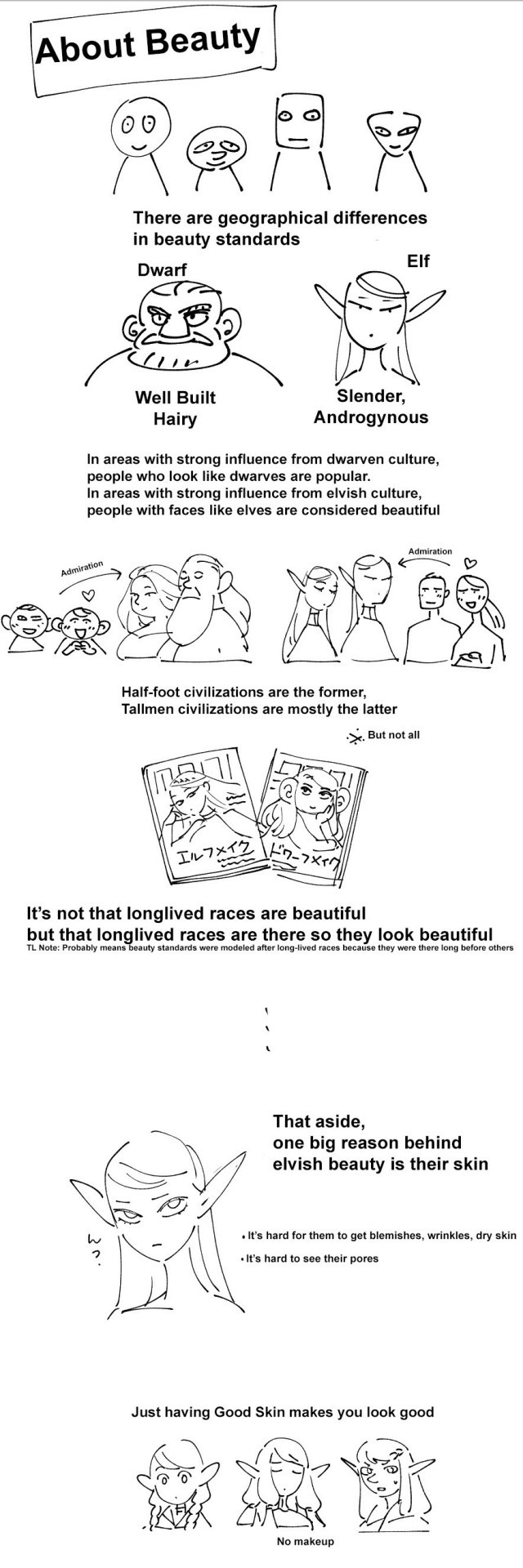

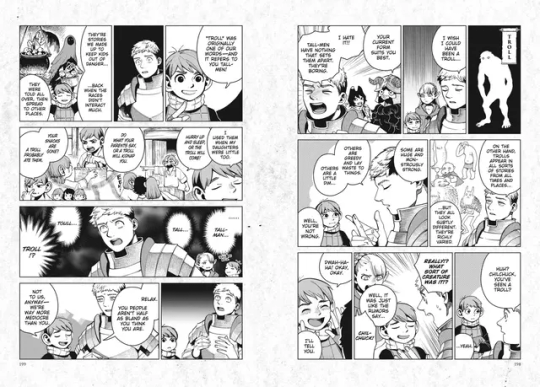
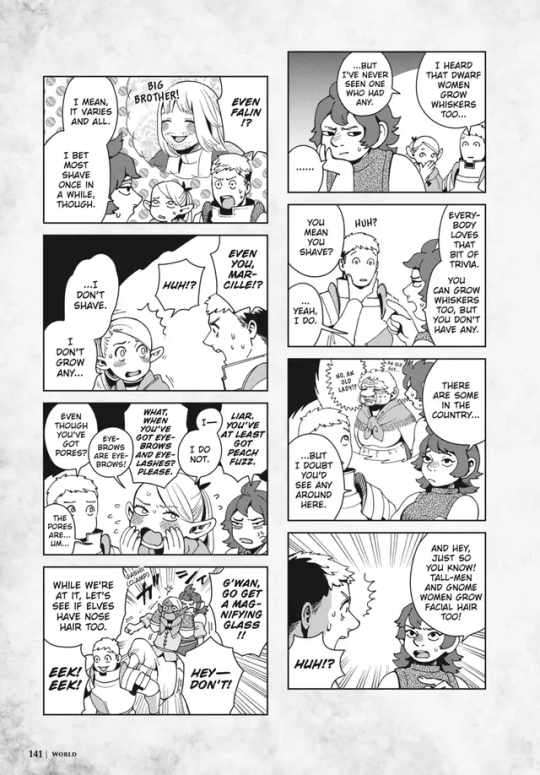
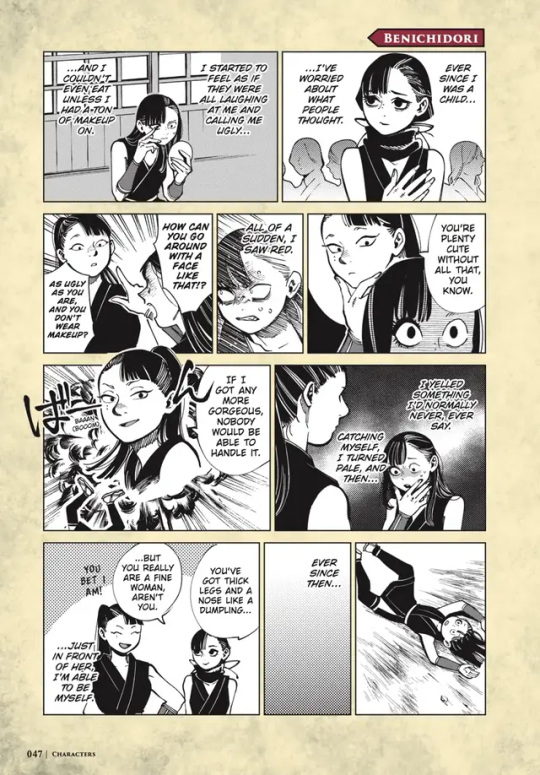

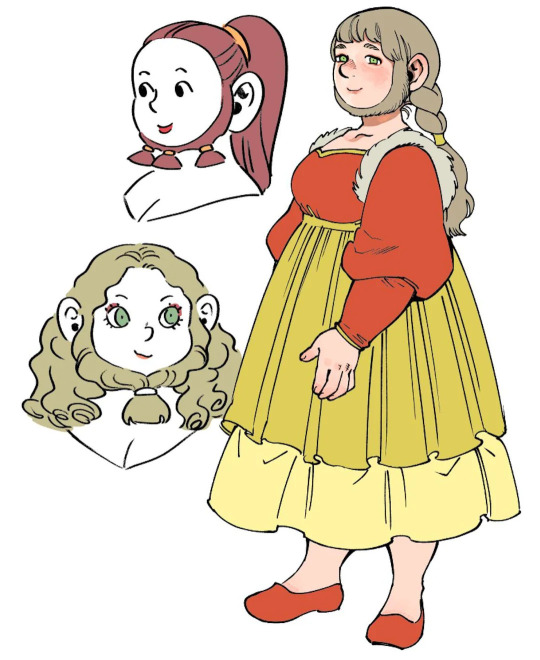
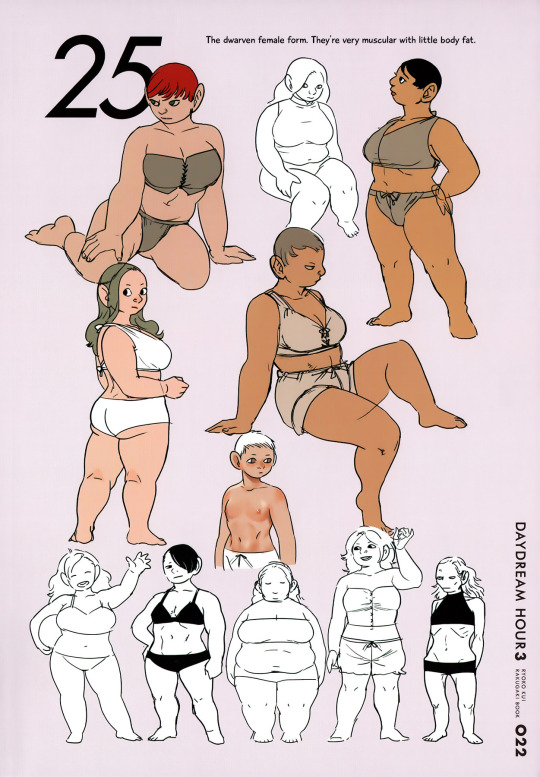
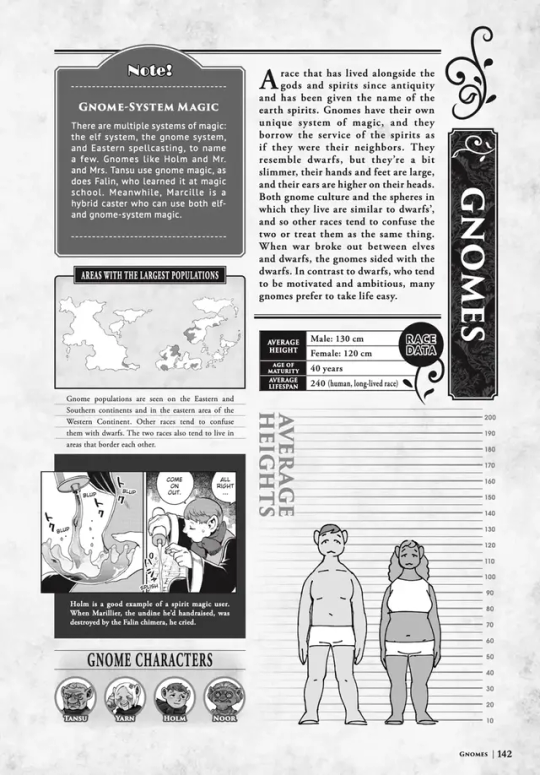

Not pictured there’s also how elven society is harsh on visibly disabled people, and how the demon took away Mithrun’s silver eyes and ears to take away his pride. There’s also how Senshi might have fit in with the orcs more easily because of the dwarven wide body shape, and how they tend to have more body hair too I suppose. In the extra on orcs we see Senshi living with the orcs and he gets judged because of the hierarchy rather than his looks.
What is fashionable also differs from culture to culture, and there’s how tattoos only seem common with elves, though dwarves and others do also sometimes have some. They seem to not raise much brows, which makes sense since for many essentially they’re for professional (magical) purposes especially with elves. Gender roles also differ in type and importance, but generally they are similar to irl ones for the races we see. Elven society seems to be the least gendered, which would be an unsurprising logical outcome of having lesser sexual dimorphism aka they look more androgynous. Comparing fashions and gender roles and how they affect beauty standards would be a whole other compilation and conversation. Kui has great worldbuilding partially because she’s got such a good grasp on sociopolitics and geopolitics. History affects cultures and beauty standards greatly. Kui’s oneshot Distant Utopia was very eye opening on her way to worldbuild and the consideration she gives these things, I do really recommend reading it.
Out of the big 5, we know the least about gnomes, but their sheet does say both culture and region are similar to dwarves’ and they end up being confused together often, so we can imagine the beauty standards are similar to dwarves’ as well.
I wanted to touch on this in a post eventually, but how one daydream hour page said half-foots tended to be curvaceous like in the artwork below puzzled me for a long time, all the half-foot characters we see during canon are rather slender and lanky after all, Chil’s succubi also being more curvy than plump. Economics are for sure a factor in that I imagine, the half-foots characters we see are all implied to be some flavor of poor or malnourished, as are half-foots depicted as empoverished oppressed minorities in general. Even comparing the artwork with the half-foot sheet’s depicted average half-foot, the ones on the left seem bigger. Wouldn’t it make sense though, if unlike dwarves half-foots don’t have similar naturally wide bodies, yet due to idolizing dwarves they work towards having a similar body shape/type to emulate them?
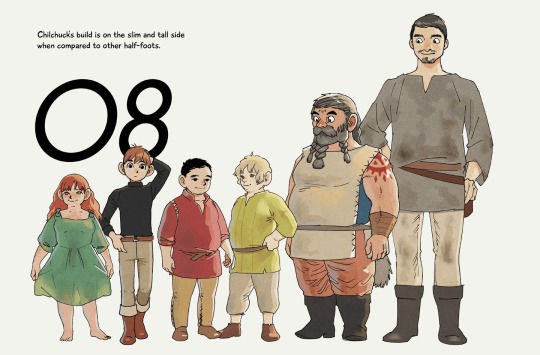
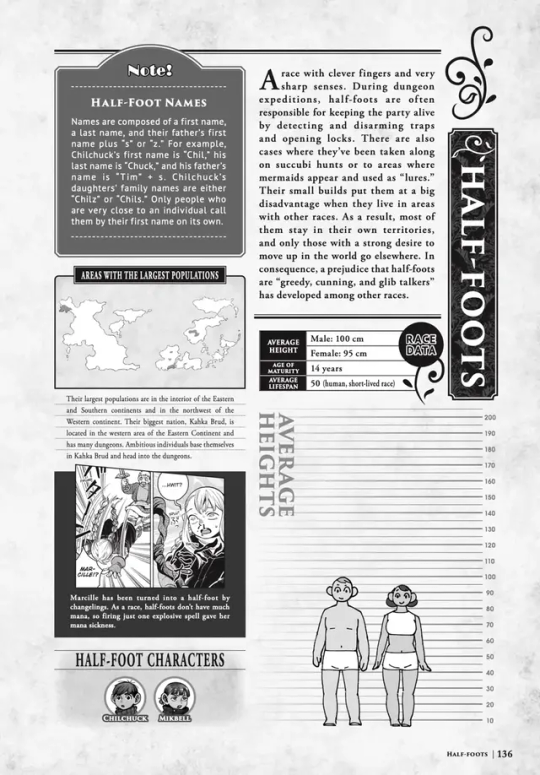
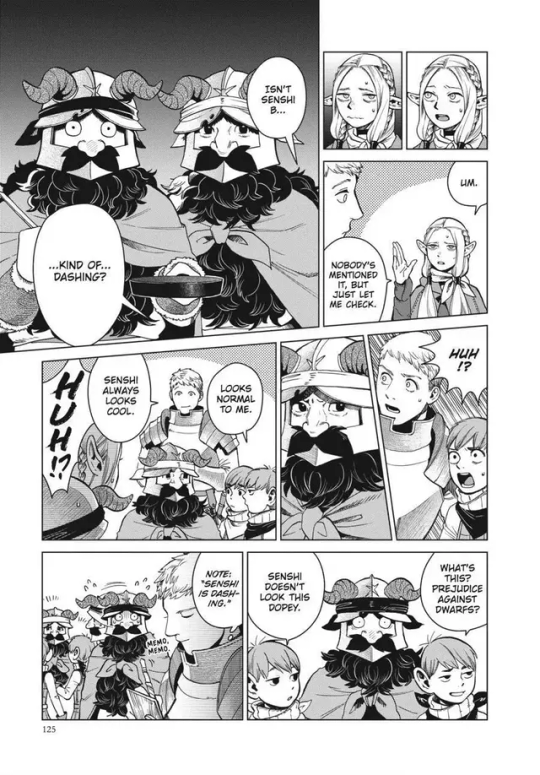
It’s said half-foots tend to stick to pretty ethnically homogeneous regions (aka half-foots-only communities) unless they move to the big city with ambition to try and make it big (like Chilchuck and his wife & kids did), and that’s interesting imo because then that would mean that in a ton of half-foot communities, they rarely see or interact with dwarves whom they try to emulate. Of course, one thing about beauty standards is that when they get adopted, at one point it stops being "this is how dwarves look and so this is how half-foots should look" and just becomes "this is how half-foots should look", most people feel as though beauty standards aren’t learned but innate, so I figure the half-foots wouldn’t have any problem still seeking dwarvish traits when there are no dwarves around.
There’s also stuff you can glean here and there if you want to extrapolate more. Like how in the race swap artworks, Mickbell is only smiling in the dwarf portrait, and Rin’s elven portrait looks very close to her elven one- Rin who is stated to be beautiful in her profile blurb. Benichidori’s extra does teach us tallmen can definitely have harsh beauty standards, but also since the text portrays her as very dysmorphic that’s likely reflected in her thoughts to a much more intense degree than is common, not an accurate strict baseline to go off. Ah, Kabru’s blue eyes are also why he and his mother lived a rough life in Kabru’s hometown, but that seems to be regional. Good post here on the topic of Kabru’s blue eyes and ties to irl history. There’s a lot to be said about Kabru being a man that in many ways is close to elven beauty standards, and how that might have affected or been affected by his upbringing with elves + his persona as someone that can effortlessly charm most people. Marcille’s section here in this essay also goes into Marcille’s struggles to fit in with the ideal image of an elf.

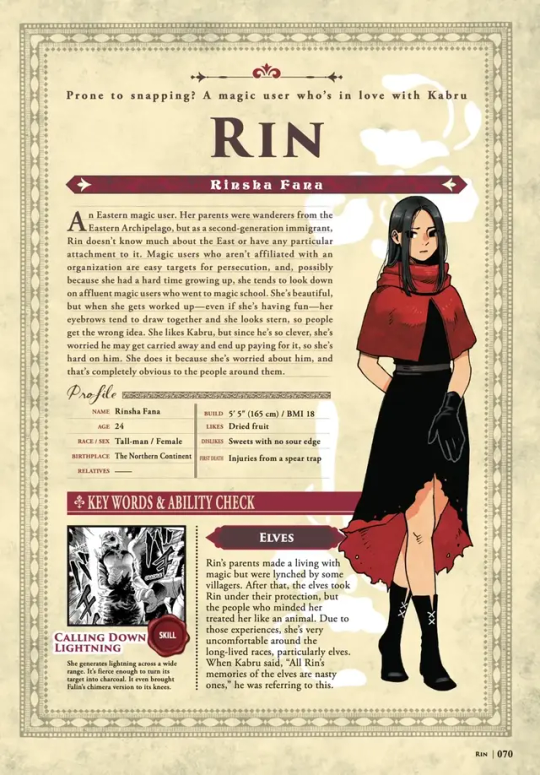
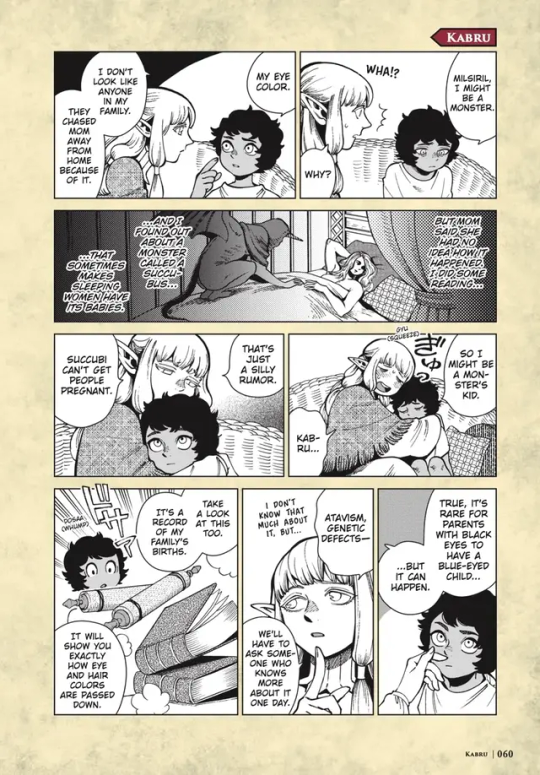
Looking human
Also notable are beastkins and demihumans: Demihumans are all dehumanized which makes people treat them worse. So if you differ from the visual idea of "human" (an in-world subjective categorization just as much as demihuman is) most people do judge you negatively. Elves and dwarves get to fight about which type of human is considered the prettiest, but demihumans are below tallmen and half-foots, they are considered as simply below the beauty contest, incompatible with it.
Onis are perhaps the demihuman people we know of with the least cultural influence on the dunmeshi world, and with the least intensely different appearance than other demihumans—they seem to be technically categorized as human to people not from the eastern archipelago?— but even them are treated as lesser than human, treated as beasts to slain for reputation points or useful strength to have around and command. It’s said their "magnificient horns" and fangs are often shaven off when the oni lives in tallman towns, so you could easily make the argument that onis are denied the right to have their own beauty standards, having to conform to other people’s and going through mutilation to take away features they might otherwise have taken pride in. Inutade was bought by the Nakamotos from a dangerous sumo fighting ring that got one of Inutade’s tooth broken on her first and only fight, and kept as a low ranking servant ever since. Remember when I said different fashions existed in dunmeshi and how those could also affect beauty standards? Like the elves, if you look at the portraits pages which include a lot of characters that aren’t in the story you can see distinct cultures within the same races, for example one young elf is bald which is in sharp contrast with the usual elven long luscious hairstyles, and that’s especially true for onis I think. Maybe not only from different regions but different eras as well… They have a bit of population in the very north of the western continent, so I like to think some of the ogres live in very cold, maybe even subarctic or arctic conditions. The point I’m getting at here is that within a race, culture/ethnicity like with Kabru will also influence them it isn’t just tallmen as a whole, different communities will have differing beauty standards. The oni history blurb and third row first collumn portrait remind me of Mongolia (which historically was a lot of different nomadic communities with different cultural identities as well. Something something, the oni empire experienced a decline and then tallmen overpowered them, and now they’re governed and split apart by stronger social classes & slavers and the richness of culture was hurt for it especially if they have no real community left of their own), but obviously many of them are dressed and look rather japanese, makes sense considering living in/close to Wa, and first row second collumn portrait reminds me of ainus which again would be logical considering geographical placement, though I’m far from an expert. Interestingly, ainus are indigenous people both in Japan and Russia- Perhaps the northern western continent ogres are meant to be closer to Russia than Canada like I imagined? Ok tangent over.

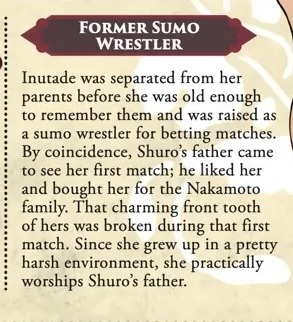

The kobold sheet says they’re especially sought after as slaves because they’re "adorable", but locally in the western continent they’re repeatedly said to be seen more as ferocious and dangerous. The dehumanization is most apparent in the first comic below. The language barrier and conflicts no doubt worsen this by a lot, but I think it’d be hard to deny that their canine appearance makes the dehumanization worse. "They’re ferocious beasts, they’re demihumans, they can’t be communicated with". Most characters in Dungeon Meshi’s world are desensitized to slavery and most characters are prejudiced one way or another. Point being, kobolds are fully removed from human beauty standards, but no doubt for kobolds, other kobolds are more beautiful than humans are. They’re assumed to be an uncivilized bunch, but just like any other people they like to adorn themselves with nice clothes and jewelry and keep themselves clean and groomed; they too take care of their appearance and take pride in it.

And the orcs! This one we have the most contact with in canon, with not only there being foreigner characters from the ethnicity or hearsay of their homelands and culture but full on contact with a community. We get to see up close what they’re like and what they think, and of course in turn they’re our introduction to how demihumans are harshly looked down upon and seen as inferior, less human and thus less worth valuing and less dignified. It’s text that orcs are ugly to most humans and humans are ugly to most orcs. Since I judged they didn’t need accompanying explanation the pictures showing this are in the pictures dump at the top.
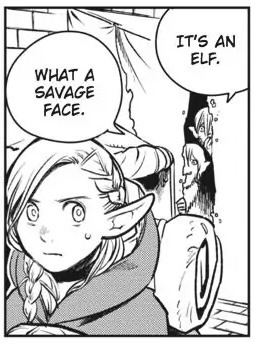
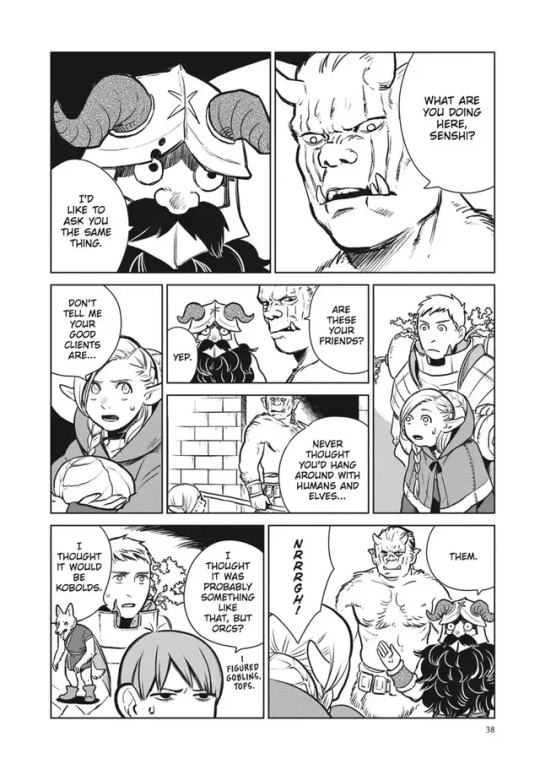
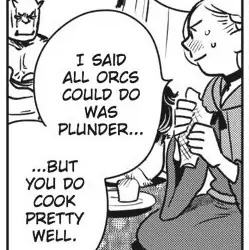
God forbid you sell vegetables to orcs my god- but then again they do basically mandate adventurers to kill any orcs they come across so yeah the world isn’t above that even a little bit.
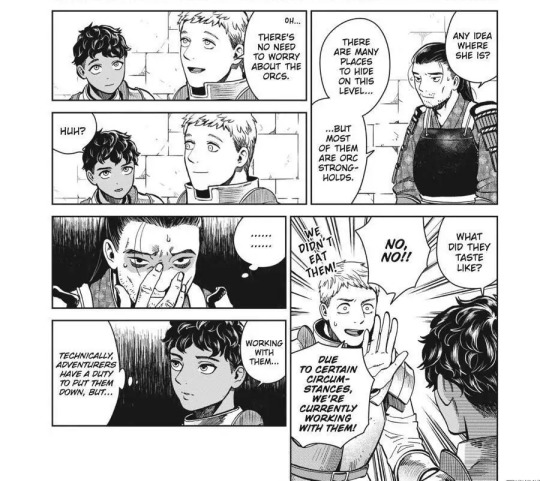
So yes, my main point here is simply that orcs are yet another evidence of the physical ideal of "human" being an important beauty standard for human societies globally.
Izutsumi is our glimpse at how beastkins are treated in the world, and in Wa at least that’s ending up being caged and mistreated as part of a freak show. Izutsumi hates her appearance and wishes she could leave the feline part of herself behind to only be human. Interestingly, not that we have a lot of info on them so this is very much a take with a grain of salt situation, but there seems to be less stigma around artificial beastmen, those who can shapeshift at will. The main difference is of course appearance, that most of the time they simply look like average tattooed humans. Artificially creating humans is an illegal practice, and no doubt it’s not well regarded, but being able to hide that makes them less likely to be discriminated at any moment, or even just discriminated less intensely. Again, looking human is important, not only for belonging but for safety’s sake. Beauty standards rule the world with harsh hands.
Mermaids and fishmen
Ok we’re done now right? Right-! But wait… Wait…! Mermaids and fishmen are said to be demihumans too, special separate cases to the main three demihuman species however, which is also represented by how mermaids and fishmen both are in the Adventurer’s Bible chapter Monsters meanwhile ogres, kobolds and orcs are in the chapter World. They’re an interesting topic because they directly tackle this topic, not only in a meta way for the readers but also making characters themselves struggle to quantify their humanity with the goal of knowing wether they should be eaten or not, especially Chilchuck. Chilchuck’s "is it really just a matter of feelings?" mini arc.
The party asking themselves "Should we eat this?" is very common, and often they end up playing a little loose on morality, like eating the red dragon’s meat despite it having digested Falin. Not unsimilarly Marcille freaks out a little over the vegetables they harvested having been grown with fertilizer, aka largely human poo. Half of the motivation of "should we eat this perhaps sentient creature" is out of consideration and compassion, but more strongly and more often, the characters struggle with a sense of taboo at eating something too closely related to humans. Even, feel uncomfortable because of the deepseated impression that eating it would dirty them in some way. Cannibalism is an interesting and relevant topic in many ways, but what I want to mention is how there’s the more or less universal belief that committing cannibalism inherently taints you as a person and turns you more monstrous, morally but also literally depending on some myths such as w*ndigos and onis in some cases, like in Touge Oni. Marcille and Izutsumi both express a fear of eating monsters turning them monstrous. Maybe this is part of what Laios was hoping for, honestly. There are two fears here, if eating a demihuman monster constitutes as cannibalism or not, and so, will eating it taint you because it’s a human, or will eating it taint you because it’s a monster? You are what you eat, until it’s a little too literal. You morally are the means by which you get your food, and you physically are the result of your nutrition. Dungeon meshi manages to mix an exploration of humanity with the theme of food because our relationship to food is very deep and complex, psychological as much as physiological.

In the end, the characters sort of shrug and accept that they’ll never quite understand the world of mermaids and fishmen and how they operate, and what that means about them. Laios is the one always challenging these notions other characters take for granted, it��s not obvious to Laios why people are softer on mammals than other animals and plants, it’s not obvious to Laios why people would be afraid of eating a monster just because it’s a monster, it’s not obvious to Laios why some food is gross to Marcille but not fish testicles, it’s not obvious to Laios why you should immediately regard orcs and kobolds badly.
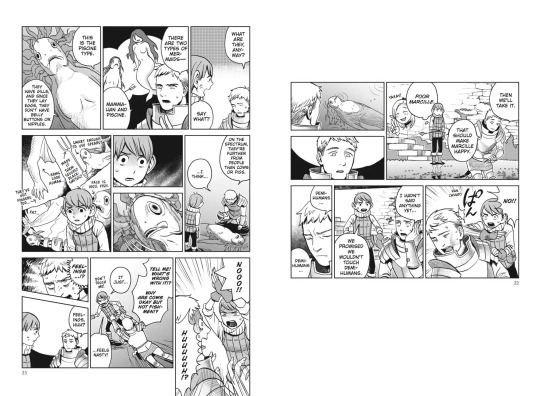
"Cows are probably closer to humans [aka closer to being human] than fishmen, though they’re clearly intelligent", dehumanization to lessen empathy towards them to be able to eat them. Meanwhile, mermaids seemingly have a less noticeable "civilization" or intelligence, they hunt in groups like fishmen, but they don’t use tools and such, they feel more primal and similarly instinct driven, and yet… Do they attract sympathy more? Mammals, humans, is it because of their nature or because of their appearance?
Both the nature and appearance of fish are ones people don’t typically sympathize with. "Fish don’t feel pain", "goldfish only have 5 seconds of memory", "it’s okay to keep fish in completely empty bowls too small for them until they die from it", so many lies and misconceptions exist that make people less considerate of them. The average lifespan of a goldfish is 10-15 years, the record is 43, but they’re not seen as lives that really matter, so a lot of goldfish die in a few weeks of bad aquarium conditions. There’s a lot of research on animals evolving to look cute and appealing to make some predators want to kill them less and parents want to care for them more, including humans. First good google research result gave me this credible short article on the topic. In Chilchuck’s weighing wether a fishman is far enough from being human or not to eat, "face is 100% fish" is his biggest argument for it being more acceptable. The face, the most important thing for empathy and recognition. The face, the decapitated fishman one that falls into his hands next chapter.
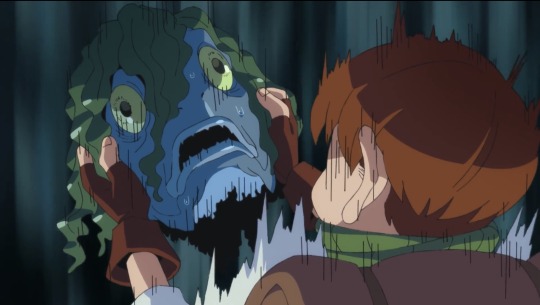

To quote @room-surprise: "Chilchuck can't explain why it's wrong to eat the merpeople, even though it's NOT complicated. But the problem is Chilchuck would have to accept and acknowledge that the merpeople might be people? And that's outside of the worldview he passively believes, so he can't just say that, because he doesn't think that's true. But that IS why he "feels" it's wrong. And it's all you'd need to say for Laios to understand! But it would require acknowledging that maybe the way they're treating and talking about the merpeople is wrong."
The idea of Chil not being able to grapple with how maybe some monsters are more humans than they seem, him who had been an advocate of half-foots rights, half-foots who get undermined and treated as inconsequential sacrifices… Grappling with how he could relate to the merpeople’s situation almost, and pulling away because it’s so existentially horrifying. I do not want to see myself into an hostile fish-faced warrior I can’t communicate with. In a way this also relates to Chilchuck being the only party member who doesn’t see Izutsumi as a cat in the relationship chart, the only one to treat her with full human dignity. He knows the struggle to be taken seriously, he knows being infantilized and he knows what it’s like to be treated as less than human.
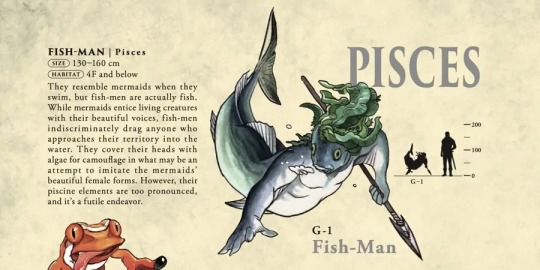
Below, you will see Chilchuck draws the line of where they become not okay to eat as when "they already look like mermaids". Above, there’s speculation that the algae hair is partly to mimic "the mermaids’ beautiful female form". Is it because mermaids are their enemies and the ambiguity might give them extra seconds to attack or flee? Is it to trick adventurers instead? It’s striking to me that this is what works, with the adventurers. Sure the fishmen are intelligent, but explicitly here, what makes them no longer acceptable prey to Chilchuck is that they look close enough to a mermaid, close enough to human. Mermaids who of course themselves have this form to entice and seduce and charm the adventurers they prey on. Chilchuck considers the intelligence due to the tridents, but most of his internal debate centers around their appearance, and the image of a fishman skewered sickens him. The power of mimicry… Mimic being a beautiful human woman. Mimic being cute, babies being wired to make us feel protective and softened. Half-foots, sometimes pretending to be children for scams or help or avoiding trouble.
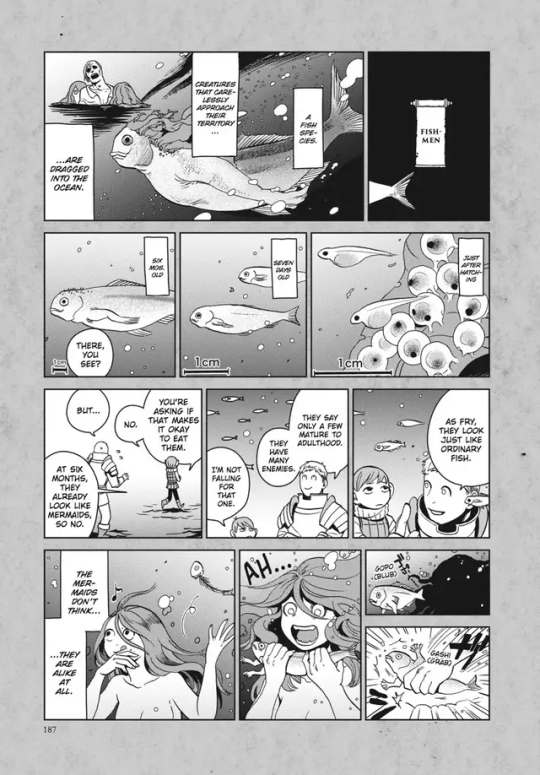
The mermaids are only concerned by their differences and not their similarities, and have no trouble treating the fishmen as food rather than peers. To an outside perspective like us, the audience, all these categorization of "more human" and "less human" between onis and orcs and elves and tallmen etc seem stupid and unfounded, but to the people living in Dungeon Meshi’s world, elves may as well be mermaids while onis are fishmen, not alike at all, unworthy of empathy and thus fine to eat.
Ultimately, Dungeon Meshi promotes unity. It’s about seeking to understand the unknown and the misunderstood, the dehumanized and the inhuman. It shows the good that comes from seeking to understand what you do not, even when that’s one another.
#Dungeon meshi#dunmeshi lore#Compilation#Ok… I think I didn’t forget anything. Feel free to point things out or discuss in comments and tags though#Delicious in dungeon#Ik i strayed a bit from the central topic but who knew beauty standards and discrimination went hand in hand /s#Ask me about my dunmeshi kobold oc……….. ask me about my dunmeshi ocs……..#Can we give body neutrality an amen#Tw racism#cw racism#The “what are you talking about Marcille. Senshi is handsome” gag has 2 layers then doesn’t it#Like obvi Marcille is noticing the difference between shapeshifter and og senshi rather than making a judgement#But the elf being *the* one to notice and say “Senshi looks more handsome than usual that’s weird??” may very well be an effect of living#with elven beauty standards yeah#Meta#I wanted to make a post on the half-foots body type thing and the oni mongolian coding and the chilchuck merman thing so#Three in one 🎵 why take the initiative when you can just wait for the tiniest opportunity#Chilchuck tims#Analysis#dunmeshi fishmen#It’s very interesting to think of how there being so many people *that* physically different affects politics and beauty standards#Mimics…. Pacing my room. Pondering. Mimics………#The burnout is over yippee#Ok but for reals though race is largely a social construct. Critical race theory good. Go read Distant Utopia by Ryoko Kui#‘Yeah sure.’ < person who thought she’d just be grabbing like 3 pics and had no clue she’d become hyperfocused for hours#The classic societal obsession for classifying and exaggerating physical traits into boxes of innate goodness vs evil…
278 notes
·
View notes